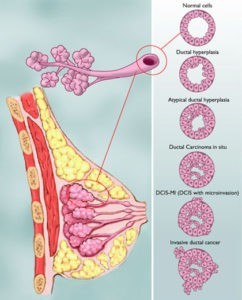Leave a Comment:
7 comments
[…] DCIS- Risk of Future Breast Cancer in Either Breast […]
ReplyHej David,
I had DCIS in left breast for 2 years ago; a mastectomy, 6 chemotherapi and 5 weeks daily radiation; the tumor was 2 cm, 2 lymphs out of 14 were with cancer; I was told that the cancer is aggresive, and when it comes back is i bone..I had to had 5 years with Letrozol, I quit after 1 year becouse of muscular pain etc and I refused Tamoxifen,
I m eating organic no animal proteins, juisec etc, I am in fitness center 2-3 / a week, and taking mushrooms in pulver..I am open for any advice as I believe in your experience.
looking forward to hear from you
Best regards
Kiki
Hi Kiki-
Several things. First of all, I am sorry to read of your DCIS diagnosis. But you appear to be working at your health so congrats. Secondly, I will email a list of evidence-based, non-toxic therapies to reduce your risk of BC to your email address. Separately, regarding your comment “, and when it comes back is in bone..” I will include in your email a study about the importance of bisphophonate therapy in BC patients BEFORE BC mets to the bones.
You will understand when you read the study. Let me know if you have any questions.
Hang in there,
David Emerson
ReplyThank you for your reply. I am going through the links in the PDF you sent and it is really great information. I have seen so many health care providers in the last three months but none of them mentioned specific benefits of certain foods or supplements. There just doesn’t seem to be a way for me to know if I made the right decision about my treatment by doing the lumpectomy and tamoxifen but foregoing radiation.
ReplyHi Vicki-
Conventional medical professionals don’t talk about non-conventional therapies like diet and or supplements. For many reasons. I am not a professional and I can’t tell people what to do I just tell people what I do and show them the studies. Your challenge re your own decision-making about your DCIS is that conventional oncology must promote FDA approved therapies such as lumpectomy, whole breast radiation and aromatase inhiitor (tamoxifen).
I believe patients like us live better, longer if we combine conventional and non-conventional therapies.
thanks and keep me post on your progress if you think of it.
David Emerson
ReplyI was diagnosed with DCIS Breast Cancer Stage 0/1 low nuclear grade on March 2, 2017. (I’m calling it stage 0/1 because the radiation oncologist told me there is nothing lower than 1 but my oncologist called it stage 0.) The DCIS was 3mm. I had a lumpectomy on April 19, 2017 with negative margins. The radiation oncologist was concerned about one margin that was 1.8mm since the standard margin is 2mm. After going over the risks of radiation I have decided not to have radiation therapy but to take Tomaxifen. What can I do to help reduce my cancer risk without radiation?
ReplyHi Vicki-
I am sorry to read of your DCIS diagnosis. I disagree with your oncologist. DCIS is not stage 1 anything. DCIS is pre-BC. Having said that, yes, studies have shown that three therapies reduce your risk of BC- lumpectomy, radiation and tamoxifen. Rad. and Tam. have side effects.
The list of evidence-based, non-toxic therapies is extensive. Too much to send using the PBC site. I will send you a PDF using your email rot…
Please read over the info in the PDF and tell me what you think as a DCIS patient. Good, Bad? Too much, too little? I’m curious.
thanks
David Emerson
Reply



